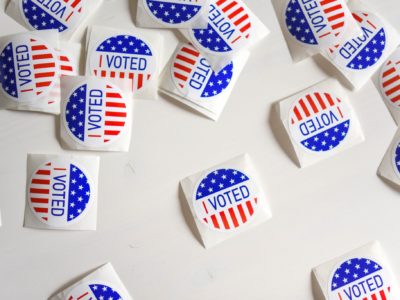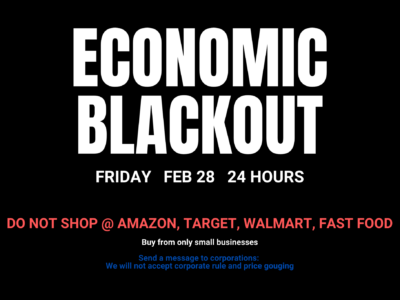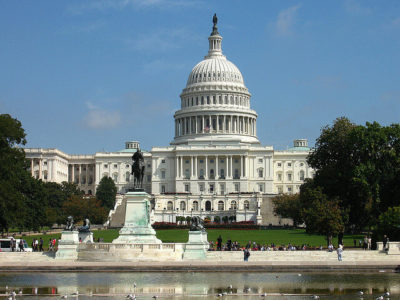With the impending election approaching, people are beginning to submit their ballots. If you feel sick of politics at this point – which really, I can’t blame you – and don’t want to go through the sometimes overwhelming process of deciding whom to vote for, stay tuned. Lucky for you, College Magazine remains to help you navigate the process, making it not only painless but also satisfactory.
Keep scrolling for all the info you need to vote in California this year.
The Basics

When you first open your ballot, you may feel a little intimidated. Whether you choose to vote in-person or by mail, it remains imperative to spend some time getting to know the issues and candidates that will appear on the ballot this fall. Here, we will provide all of the information you need to prepare for voting on November 3.
The ballot comprises of both candidates (people) and measures/propositions (issues) that citizens may vote on. This year, the California ballot features 12 propositions as well as a varying number of candidates based on the county in which you register. In this article, we will walk you through this year’s propositions as well as the political offices up for re-election.
But first, let’s do a little Q&A.

Q: When is Election Day?
A: Tuesday, November 3, 2020
Q: By when do I have to register as a voter?
A: November 3 for in-person voting or October 19 if voting online or by mail
Q: Can I register online?
A: Yes
Q: Can I opt for same-day registration?
A: Yes
Q: When did early voting begin?
A: October 5
Q: What deadline must I meet for absentee/mail voting?
A: November 3 (postmarked), November 20 (received)
Q: Do you need a voter ID?
A: No
Q: When shall the polls open?
A: 7 a.m. to 8 p.m.
Measures

You may hear conflicting PSAs on television or the radio imploring you to “vote NO on Prop XYZ if you care about this state” or “MILLIONS of lives are at stake…vote YES for measure ABC.” It can all get very confusing, so we can just go ahead and break it down for you. Below stand the 12 propositions (another word for measures or issues) on this year’s ballot. A lot of people may feel tempted to skip right over and get to the good stuff (i.e. presidential candidates), but many Californians’ livelihoods depend on these propositions, so it remains essential to cast your vote on each and every one. Let’s get started!
California Proposition 25: Replace Cash Bail with Risk Assessments Referendum

The run-down: Prop 25 addresses a law passed in 2018 that abolished cash bail. Companies in the bail industry quickly instituted a referendum before the law went into effect. Civil rights activists think the cash bail system appears unjust but others fear placing too much power in judges’ hands could be dangerous.
YES: If you vote “yes” for prop 25, it means you want to uphold the 2018 law to end cash bail. Suspects would be detained based on the judge’s discretion.
NO: If you vote “no” for prop 25, it means you want to reject the law and reinstate the system that previously existed for decades.
California Proposition 21, Local Rent Control Initiative

The run-down: In response to the lack of affordable housing in California, Governor Newsom signed a law this past year that prohibits landlords from increasing rent by more than 5% — plus inflation – each year. However, Prop 21 would allow for even stricter rent control policies on housing that stands more than 15 years old.
YES: If you vote “yes” for prop 21, it means you support local governments’ right to enact rent control on housing 15 or more years old.
NO: If you vote “no” for prop 21, it means you oppose the rent control on these properties.
California Proposition 15, Tax on Commercial and Industrial Properties for Education and Local Government Funding Initiative

The run-down: This proposition aims to revise the property tax rules that prop 13 enacted in 1978. Currently, property taxes remain based on how much the property cost when purchased, not its current worth. Under Prop 15, property taxes for commercial properties (like businesses) would increase over a three-year period. The revenue would go to local government services and schools.
YES: If you vote “yes” for prop 15, it means you support the property tax increase and subsequent distribution of tax revenue on commercial properties.
NO: If you vote “no” for prop 15, it means you wish the commercial property tax structure in California to remain the way it currently is.
California Proposition 17, the Voting Rights Restoration for Persons on Parole Amendment

The run-down: Prop 17 would result in a constitutional amendment that would allow those on parole to vote. This would allow 40,000 Californians to vote that currently cannot.
YES: If you vote “yes” for prop 17, it means you support giving people on parole for felonies the right to vote.
NO: If you vote “no” for prop 25, it means you oppose allowing those on parole for felony convictions the right to vote.
California Proposition 24, the Consumer Personal Information Law and Agency Initiative

The run-down: This one can get a little technical. First off, it remains important to know that a statewide privacy law went into effect this past January, requiring technology companies to inform consumers if they collect their data and consumers can request the destruction of their personal information. Prop 24 seeks to add to this law, redefining the term “sharing” when it comes to data. The SF real estate developer who pushed the earlier law has returned. This time, he argues that consumers should enjoy rights such as correcting inaccurate information about them and the limitation of their personal information.
YES: If you vote “yes” for prop 24, it means you want to expand the state’s consumer data privacy laws
NO: If you vote “no” for prop 24, it means you do NOT want to expand the state’s consumer data privacy laws
California Proposition 18, the Primary Voting for 17-Year-Olds Amendment

The run-down: More exciting stuff, people! Prop 18 would allow 17-year-olds to register and vote in primary elections if they turn 18 by the time of the general election in November. “In my eyes, if someone is turning 18 by the general election and is knowledgeable on the issues, that qualifies them to vote in the primaries,” University of San Diego sophomore and member of USD Democrats club Hana McAnally said. Logically, this makes sense. If you’re going to vote in the general election, you should have a say in which candidates will be on that ballot, right?
YES: If you vote “yes” for prop 18, it means you think 17-year-olds should be permitted to vote in primaries if they will turn 18 before the general election.
NO: If you vote “no” for prop 18, it means you oppose allowing 17-year-olds to vote in primaries if they turn 18 before the general election
California Proposition 20, the Criminal Sentencing, Parole, and DNA Collection Initiative

The run-down: In response to initiatives that reduced penalties for crimes such as property crimes (theft, fraud, etc), prop 20 seeks to make some of these crimes chargeable as felonies rather than solely as misdemeanors. “After visiting San Quentin federal prison as part of my coursework in criminal justice, I believe that locking people up in prisons for years is counterproductive. With the greatest incarcerated population percentage of any country in the world, we should cease creating harsher sentencing and denoting more crimes as felonies,” Sonoma State sophomore Danielle Romero said. In addition, this proposition lobbies to require DNA collection for certain misdemeanors, like theft or domestic violence.
YES: If you vote “yes” for prop 20, it means you want the government to add more crimes to the list of violent felonies and require DNA collection for some misdemeanors.
NO: If you vote “no” for prop 20, it means you do NOT want the government to add more crimes to the list of violent felonies and require DNA collection for some misdemeanors.
California Proposition 19, the Property Tax Transfers, Exemptions, and Revenue for Wildfire Agencies and Counties Amendment

The run-down: Proposition 19 targets older Californians (ages 55 and up) who want to purchase new homes but feel hesitant due to the prospect of increased property taxes. This measure would allow these citizens to purchase new homes without raising their property taxes, depending, of course, on the value of the houses. In addition, it would apply to those who lost their home due to wildfires. Finally, it would also decrease tax breaks given to adult children to inherit a house that remains used as a rental or second home from their parents. The revenue generated would go towards the firefighting efforts in the state.
YES: If you vote “yes” for prop 19, it means you support the tax transfers and exemptions for properties listed above
NO: If you vote “no” for prop 19, it means you do NOT support the tax transfers and exemptions listed above
California Proposition 16, the Repeal Proposition 209 Affirmative Action Amendment

The run-down: This one stays really simple but the wording can get confusing, so hang in there for a minute. Proposition 16 seeks to repeal (that is, get rid of) the repeal of the affirmative action amendment (Proposition 209) put into place in 1996. To rephrase: this proposal would allow for the practice of affirmative action in the state of California. For a refresher, affirmative action means that public organizations can take race, ethnicity and gender into account when determining college acceptances and government contracts.
YES: If you vote “yes” for prop 16, it means you support repealing Proposition 209 (that is, you wish to REINSTATE affirmative action)
NO: If you vote “no” for prop 16, it means you do NOT support repealing Proposition 209 (that is, you do NOT wish to reinstate affirmative action)
California Proposition 14, the Stem Cell Research Institute Bond Initiative

The run-down: 16 years ago, California approved borrowing $3 billion to finance a public stem cell research project. Now, those funds have almost all been spent. Alas, proposition 14 seeks to issue $5.5 billion more in government bonds to finance stem cell research. It would also update rules in how the money can be spent (i.e, give patients more access to stem cell treatment). Stem cells have been proven to work for regenerative purposes in diseases such as Parkinson’s, and even in COVID antibody treatment. For example, the Regeneron treatment given to Trump relied on cells from an aborted fetus (yikes, how’s that for controversy?).
YES: If you vote “yes” for prop 14, it means you support issuing more government bonds for stem cell research
NO: If you vote “no” for prop 14, it means you do NOT support issuing government bonds for stem cell research
California Proposition 23, the Dialysis Clinic Requirements Initiative

The run-down: This one can get a little confusing, so buckle your seatbelts. First of all, it deals with patients on kidney dialysis, a lifesaving treatment for those with kidney failure. It affects 70,000 Californians undergoing dialysis treatment. This proposition, though initiated by a healthcare workers union has faced opposition from the dialysis clinics themselves, which makes it tricky. The proposition would require one physician to always remain present at the clinics. It would also require clinics to provide more information regarding infection among their dialysis patients. Finally, it would force clinics to obtain consent from the state health department before closing a clinic as well as prohibit discrimination amongst patients regarding how they pay for their care.
YES: If you vote “yes” for prop 23, it means you support the reforms to dialysis clinics listed above
NO: If you vote “no” for prop 23, it means you oppose the reforms to dialysis clinics listed above
California Proposition 22, the App-Based Drivers as Contractors and Labor Policies Initiative

The run-down: Last but certainly not least, Prop 22 addresses a highly contended issue you may have already heard about. Assembly Bill 5, passed in Sacramento last year, designated rideshare and delivery drivers (think Uber, Lyft, DoorDash, etc) as employees rather than independent contractors. This forces the companies to pay them benefits. However, rideshare companies immediately worked to undo AB 5, in essence reclassifying their drivers as contractors. They would, however, provide them with benefits such as a guaranteed wage (slightly above the state minimum wage), a monthly health insurance stipend (with many exceptions of course), new medical and disability benefits for drivers injured on the job. and new laws regarding sexual harassment and background checks under prop 22.
YES: If you vote “yes” for prop 22, it means you want to define rideshare and delivery drivers as independent contractors, developing new labor and wage policies accordingly.
NO: If you vote “no” for prop 22, it means you want to allow California Assembly Bill 5 to decide whether app-based drivers should be classified as employees or independent contractors.
Candidates
Candidates vary by county and region within states. You may vote for your local candidates for US Representatives, State Senators, State Assembly, as well your city’s municipal candidates (mayor, city council, etc). Despite recall election rumors, it looks like Governor Newsom remains here to stay for this year. The list of offices and candidates can get confusing since they vary so much. Alas, I’ll use an example from San Francisco, where I registered.
*Note: For information about the candidates in your county, check out a Voter Information Pamphlet and Sample Ballot that should be mailed to you with an absentee ballot or Ballotpedia.
California State Assembly District 19
The Candidates

Phil Ting (Democrat) – Currently the Chair of the Assembly Budget Committee, Ting has worked tirelessly to create affordable housing, speed up the transition to electric vehicles, and implement gun reform, amongst other achievements. He wants to effectively spend tax dollars through infrastructure repair and furthering the development of clean energy and housing.

John P. McDonnell (Republican)– An SF native and alum of my alma mater (go cats!), McDonnell prides himself on his long history and commitment to the city of San Francisco. He graduated from UC Berkeley Law School and has worked as an attorney for 35 years. McDonnell wants to provide homeless people suffering from addiction and mental health crises with medical treatment. He also seeks to cut down on property crime and lower taxes and regulations for businesses.
For reference: here is a list of all of the federal offices up for grabs in California in 2020:
- California’s 10th Congressional District election
- California’s 16th Congressional District election
- California’s 21st Congressional District election
- California’s 22nd Congressional District election
- California’s 25th Congressional District election
- California’s 25th Congressional District election
- California’s 25th Congressional District special election
- California’s 45th Congressional District election
- California’s 50th Congressional District election
- California’s 53rd Congressional District election
Presidential Election
And finally, for the grand finale and what you’ve all been waiting for: the Presidential Election. If you read this far, I really hope you already know the two candidates, what they stand for and have an idea of whom you plan to vote for. However, just for fun, I’ll do a little review:
The Candidates

Donald Trump (Republican): The current President of the United States, Donald Trump runs for re-election with Mike Pence. Stances on important issues include: pro-life, not in favor of climate reform, anti-immigration and pro-border security, does not view the rights of LGBTQ+ or people of color as a priority, pro-2nd amendment but anti-gun safety.

Joe Biden (Democrat): Former Vice President under the Obama Administration, Joe Biden runs with Kamala Harris. Stances on important issues include pro-choice, climate policy reforms, pro-immigration and border security, pro-LGBTQ+ rights, pro-police reform, pro-2nd amendment and gun safety.
Where Things Stand Today:

For the past few months, most polls have predicted that Biden will win the election. Ever since the first disastrous presidential debate, the margin between the two candidates continues to widen. However, we all sat and watched in awe – or horror – as Donald Trump secured the office in 2016, despite every major polling organization predicting a victory for Hillary Clinton. “Shy Trump Voters” (voters afraid of admitting they support Trump for fear of judgment) may still lurk in America today. And after some of the controversial decisions and statements the President has made this past year, people may feel even more reluctant to disclose their support of him than in 2016.
The bottom line

We really don’t know who will win the election. We do know that so far, we appear on track to have the largest voter turnout since 1908. The American people seem passionate about this election and know what lies at stake.
Please avoid casting a third-party vote or skipping out on this vote because you ‘don’t like either candidate.’ “Due to the construction of the American political system, two major political parties have been in power since its inception. To vote third party is simply a futile attempt to change a system that wasn’t designed to handle such actions. In an election, this important where so many basic human rights are at stake, voting third party or not voting at all is extremely privileged,” University of San Diego sophomore and Vice President of USD Votes Campaign Brooke Powell said. Whether you like it or not, either Donald Trump or Joe Biden will lead our country for the next four years. It remains up to YOU in which direction our country goes. Now go out and vote!



















